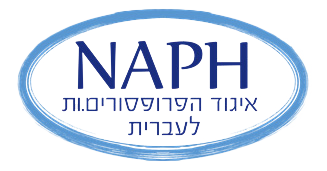
President’s Perspective
For almost 75 years, the National Association of Professors of Hebrew has served as a professional home for scholars of Hebrew language, literature, and culture. NAPH’s mission of supporting their work is perhaps more important now than it has ever been. We face mundane but consequential challenges, such as declining enrollments in Hebrew at American universities; we also must grapple with the dire reverberations of a devastating ongoing war, which have impacted our colleagues in Israel and beyond in myriad ways. NAPH’s annual conference continues to provide a space for discussion and the development of new ideas in Hebrew language and culture, ideas that often find their way into the pages of our journals, Hebrew Studies and Hebrew Higher Education.
Even as NAPH strives to offer stability in these uncertain times, we have worked to meet the expectations and changing needs of our members. Over the last few years, we have made great strides in welcoming graduate students into the organization and have worked to enhance inclusivity and collegiality for all our members. Our recent update of the NAPH website includes a new format of Iggeret, formerly the annual NAPH newsletter, edited by Zev Garber. Iggeret will now serve as an online bulletin of news and reports on activities germane to NAPH’s mission and will be accessible under the “News” tab of our website.
I want to take a moment to acknowledge a few changes in the leadership of NAPH. Ilana Szobel (Brandeis University) worked tirelessly to help keep members engaged with NAPH during and after the pandemic in her role as co-chair of the Literature division. Together with Dana Olmert (Tel Aviv University), she established the wonderful virtual series “Conversations with Friends (Who Are Also Authors),” which featured discussions about new books in Hebrew literary studies. Ilana has now taken on the roles of NAPH 2nd Vice President and NAPH International Conference Coordinator. She joins other recently appointed officers: Pamela Barmash (Washington University in St. Louis), formerly the editor of Hebrew Studies, is currently serving as NAPH 1st Vice President; and W. David Nelson (Society of Race, Ethnicity and Religion) is serving as editor of Hebrew Studies. I want to also express my gratitude to Hélène Dallaire (Denver Seminary), who is stepping down from her role as the Coordinator of the Eta Beta Rho Hebrew Honor Society. I am glad to work alongside such committed colleagues to ensure that NAPH can continue to uphold its mission of supporting new scholarship on Hebrew language and culture.
Karen Grumberg
The University of Texas at Austin
NAPH President
